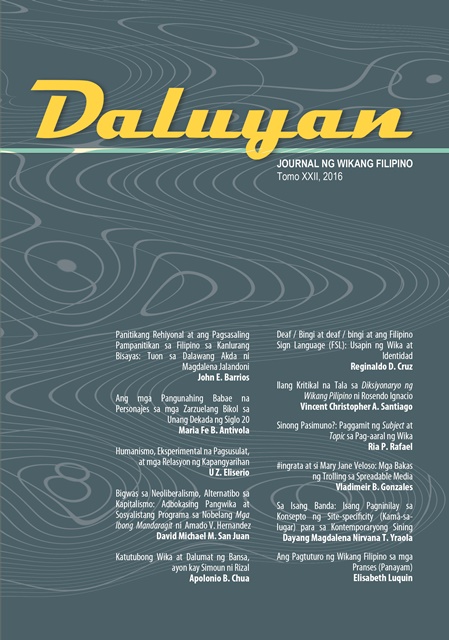Ilang kritikal na Tala sa Diksiyonaryo ng Wikang Pilipino ni Rosendo Ignacio
Abstract
Inihaharap ng papel ang ilang kritikal na tala sa Diksiyonaryo ng Wikang Pilipino (DWP) ni Rosendo Ignacio na inilimbag noong 1958 ng Samar Publishing, Co. Sa pagkilates sa mga estruktural na katangian sa iba’t ibang antas: mega-, macro-, micro-, cross-reference structure, atbp. at isinasaad na punsiyon ng DWP, dumudulog ang pag-aaral na ito sa mga establisadong prinsipyo ng kontemporaneong leksikograpiya at kritisismong pandiksiyonaryo. Sa antas na ito ng analisis ay lumilitaw na may mga pagkukulang ang DWP bilang isang diksiyonaryong nakatuon sa mga mag-aaral ng mababa at mataas na paaralan, i.e. may tahasang nakasaad na pedagohikal na punsiyon. Kakikitaan din ng ilang kontradiksiyon sa isinaad na metodolohiya at teoretikal na lapit ng DWP sa realisasyon nito sa aktuwal na mga katangian ng diksiyonaryo gaya ng ortograpiya, pagpili ng lemma, atbp.
Bagamat nakatuon sa estruktura, nakaangkla pa rin ang lahat ng obserbasyon, puna, at ebalwasyon sa mga kongkretong historikal na kondisyon at konteksto ng pagkakasulat at pagkakalimbag sa DWP: ang mga panimulang yugto sa kasaysayan ng pagsusulong ng Wikang Pambansa na ngayo’y tinatawag na Filipino.
Mga susing salita: Rosendo Ignacio, leksikograpiya, diksiyonaryong pedagohikal, Wikang Pambansa, polisiyang pangwika
This paper forwards some critical notes on Rosendo Ignacio’s Diksiyonaryo ng Wikang Pilipino (DWP) published in 1958 by Samar Publishing, Co. In analyzing its structural characteristics on multiple levels: mega-, macro-, micro-, cross-reference structure, etc. and also the stated purpose of the DWP, the study subscribes to established principles of contemporary lexicography and dictionary criticism. On this level of analysis, it is apparent that the DWP is lacking in certain respects as a dictionary intended for use at the primary and tertiary levels, i.e. a dictionary that has an explicitly-stated pedagogical function. Several contradictions are also identified in terms of methodology and the theoretical framework of the DWP vis-à-vis the realization of these in the actual characteristics of the dictionary such as its orthography, lemma selection, etc.
Although focused on structure, all observations, critiques, and evaluations are grounded on concrete historical conditions and the context in which the DWP was written and published: the initial phases in the history of the development of the National Language which we now call Filipino.
Keywords: Rosendo Ignacio, lexicography, pedagogical dictionaries, National Language, language policy


